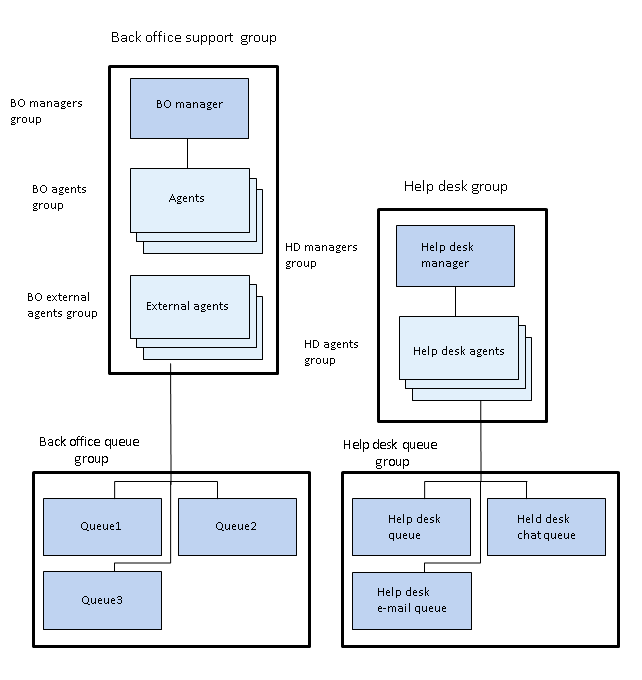Creating User Groups: Example 1
This example describes how to create four-level hierarchical user groups and how their rights are formed. This example describes the Back office support group
.

This list describes the four different levels in the user group hierarchy.
-
The top level:
Back office support group
At the top level, settings that can be inherited by all subgroups are configured. In this example, the Serve and the Statistics Summary rights to
Back office queue group
are used as common rights. This means that all users in all subgroups have these rights. The lower you go in groups, the more you can configure group-level rights or settings. Inheritance goes from top to bottom.Assignment Block
Data
Members
BO agents group
User Rights
The Serve and Statistics Summary rights to
Back office queue group
-
The second level:
BO external agents group
This is the group of users that have as few rights as required to serve in queues.
Assignment Block
Data
Members
BO agents group
Parents
Back office support group
User Rights
Inherited rights from
Back office support group
: the Serve and Statistics Summary rights toBack office queue group
-
The third level:
BO agents group
In this group, the users can have more queues in which to serve or more user rights.
Assignment Block
Data
Members
BO managers group
Schneider, Michaela
Parents
BO external agents group
User Rights
-
Inherited rights from
Back office support group
: the Serve and Statistics Summary rights toBack office queue group
-
Direct user rights: Statistics Details for
Back office queue group
and the Serve and the Statistics Summary rights forSales queue group
-
-
The fourth level:
BO managers group
In this group, the managers have full rights to all other users in the subgroups. They also have inherited rights to
Back office queue group
andSales queue group
. When additional direct user rights for queue groups are given to managers at this level, there is no overlapping of user rights. The members of this group (that is, the managers) receive their rights from one place. With direct rights for user groups, the managers can monitor all other user groups from the top level to the last level. Different rights can be selected for individual user groups. In this example, supervisor-related and monitoring rights are given.Assignment Block
Data
Members
Legrand, Monique
Perrin, Nathalie
Parents
BO agents group
User Rights
-
Inherited rights: the Serve and Statistics Summary rights to
Back office queue group
,Statistics Details forBack office queue group
and the Serve and the Statistics Summary rights forSales queue group
-
The following direct rights to the two queue groups: View, Modify, Delete, Manage, Manage Members, Control Contacts, Statistics Details, Listen to Recording, Manage Contact History, and Manage Voicemails
-
Direct rights: supervisor-related and monitoring rights to
Back office support group
,BO external agents group
,BO agents group
, andBO managers group
-
